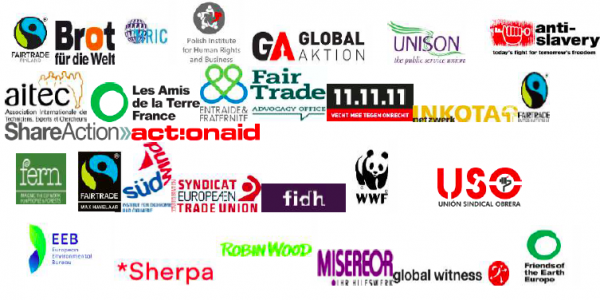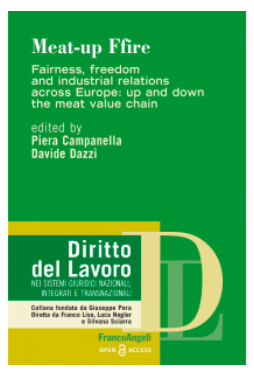Statement signed by over 80 NGOs and trade unions
A call for human rights and environmental due diligence legislation
We the undersigned civil society organisations and trade unions, are calling for effective EU legislation that establishes a mandatory human rights and environmental due diligence framework for business, companies and financial institutions operating, or offering a product or service, within the EU. Such legislation should establish a corporate duty to respect human rights and the environment and require companies and financial institutions to identify, prevent, mitigate and account for abuses and harm in their domestic and global operations, activities, products, services, supply chains and exports. The legislation should hold such companies legally accountable and provide access to justice for victims.
Some businesses and financial institutions are already taking steps to meet their responsibility to respect human rights and the environment in their global operations, subsidiaries, portfolios and/or supply chains. However, too many others are linked to serious abuses. Exploitative working conditions, including modern slavery and child labour; gender discrimination and violence; violations of trade union and workers’ rights; corruption and tax evasion; toxic pollution; rampant destruction of forests; the climate crisis, land-grabs and evictions of indigenous peoples and local communities, and violent attacks on human rights, environmental and land defenders are widespread in the global value chains of companies conducting business in the EU. Women, children, indigenous peoples, workers and their unions, human rights defenders and marginalised groups tend to be particularly affected.
Current EU policy and legislation fails to adequately address this challenge. Despite growing attention being paid to these issues, there are still no cross-sectoral laws in the EU requiring companies and financial institutions to identify, prevent, mitigate and account for human rights abuses and environmental damage of their operations, subsidiaries or value chains. Absence of such laws, makes it impossible for companies to be held legally accountable when they neglect their responsibility to respect human rights and the environment. Meanwhile, consumers across the EU purchase products and services tainted by abuses and environmental devastation, and millions of savers have their (pension) savings invested in companies that are behind these abuses. It’s time to change this! The reliance on a voluntary approach to promote business respect for human rights and the environment has proven insufficient and does not prevent violations of human rights and environmental damages.
What we’re calling for and how it would make a difference
Human Rights and Environmental Due diligence is a concept familiar to companies and governments. The standard has already been set out in detail in the UN Guiding Principles on Business and Human Rights, in the OECD Guidelines on Responsible Business Conduct as well as the sector specific and general OECD Due Diligence Guidances. Following France’s adoption of a duty of vigilance law in 2017, other countries are adopting or discussing similar legislation. A number of companies, sometimes supported by multi-stakeholder initiatives, already have systems in place to implement these guidelines. It is now time for the EU to build on these precedents and harmonise the expectations towards companies in law, protecting both human rights and the environment.
We want companies and investors to be required to carry out human rights and environmental due diligence – that is, to identify, assess, stop, prevent and mitigate the risks and violations to all human rights, including workers and trade union rights, and the environment posed by their own activities, subsidiaries, investee entities, and business relationships, within and outside the EU. Rights holders, in particular workers, their unions and affected communities should be involved in the negotiation and implementation of due diligence plans. Due to their leverage as shareholders, investors should actively seek to ensure that such plans be in place. If a company fails to respect its obligations and abuses do occur, avenues must be available to hold it to account in court and for victims of abuses to receive justice and remedy.
New binding EU legislation that increases protection for individuals and communities, workers and their representatives, human rights defenders, and the environment is needed. It will provide clarity on what the minimum standard for responsible business conduct means in practice and stimulate the shift we need towards a more sustainable and fair level playing field. An effective legislation will lead to a better protection of human rights. It will contribute to giving consumers, savers, retail investors and stakeholders at large the much needed confidence that products, services or financial products are free from human rights abuses and environmental damage. The EU’s reputation as a leader in promoting responsible business conduct will also be enhanced.
The EU needs to provide global leadership. Around the world, policy makers, business leaders, academics and campaigners are supporting legislative change to end irresponsible corporate practices. Across Europe and beyond, there is a growing trend towards introducing mandatory human rights and environmental due diligence at the national level. At the UN, a treaty is being developed to regulate the activities of transnational corporations and other business enterprises in international human rights law. We expect the EU to play a constructive role in the UN backed negotiations.
As the world’s largest economy, founded on the principles of democracy, human rights and the rule of law, with various human rights and environmental policy goals, it’s vital that the EU takes the lead in and develops a clear and comprehensive economy-wide legislation.
Source: etuc.org




